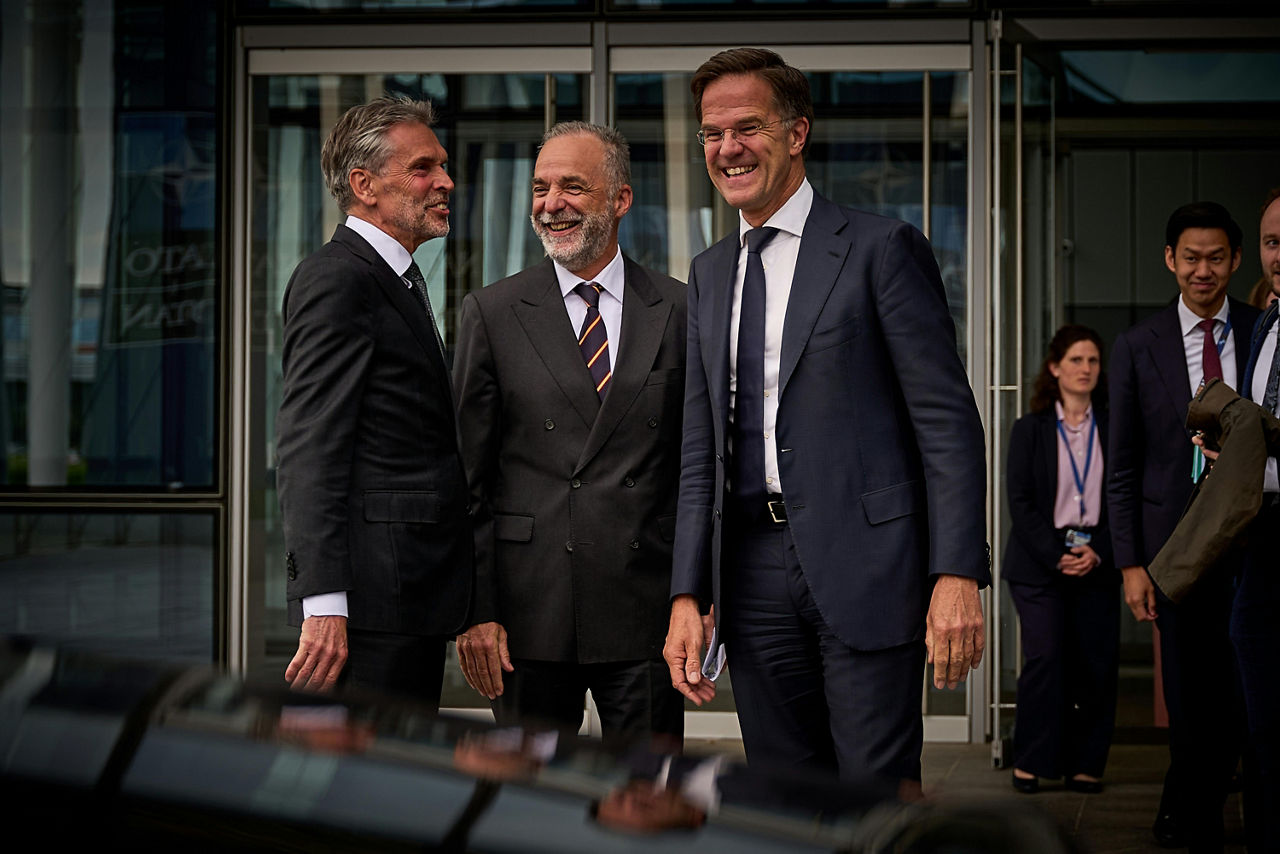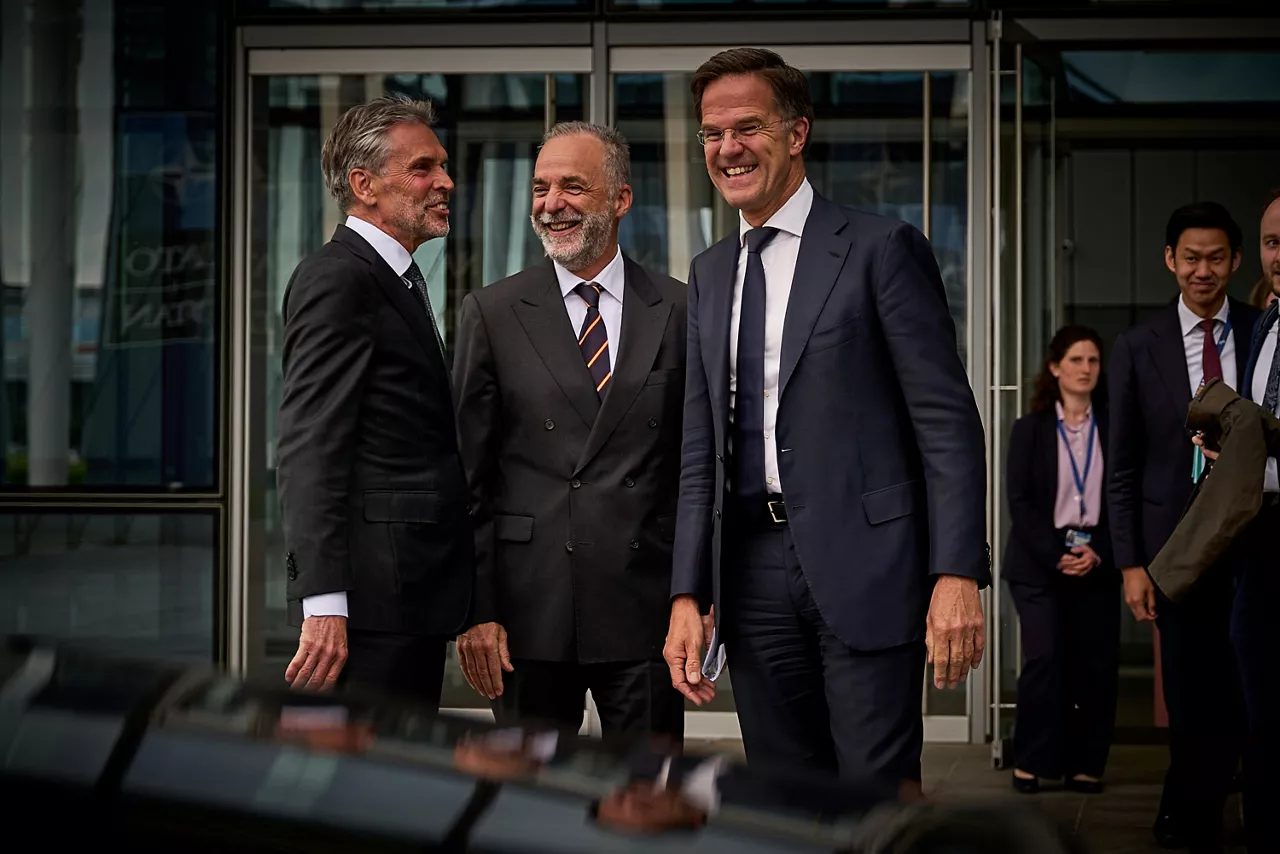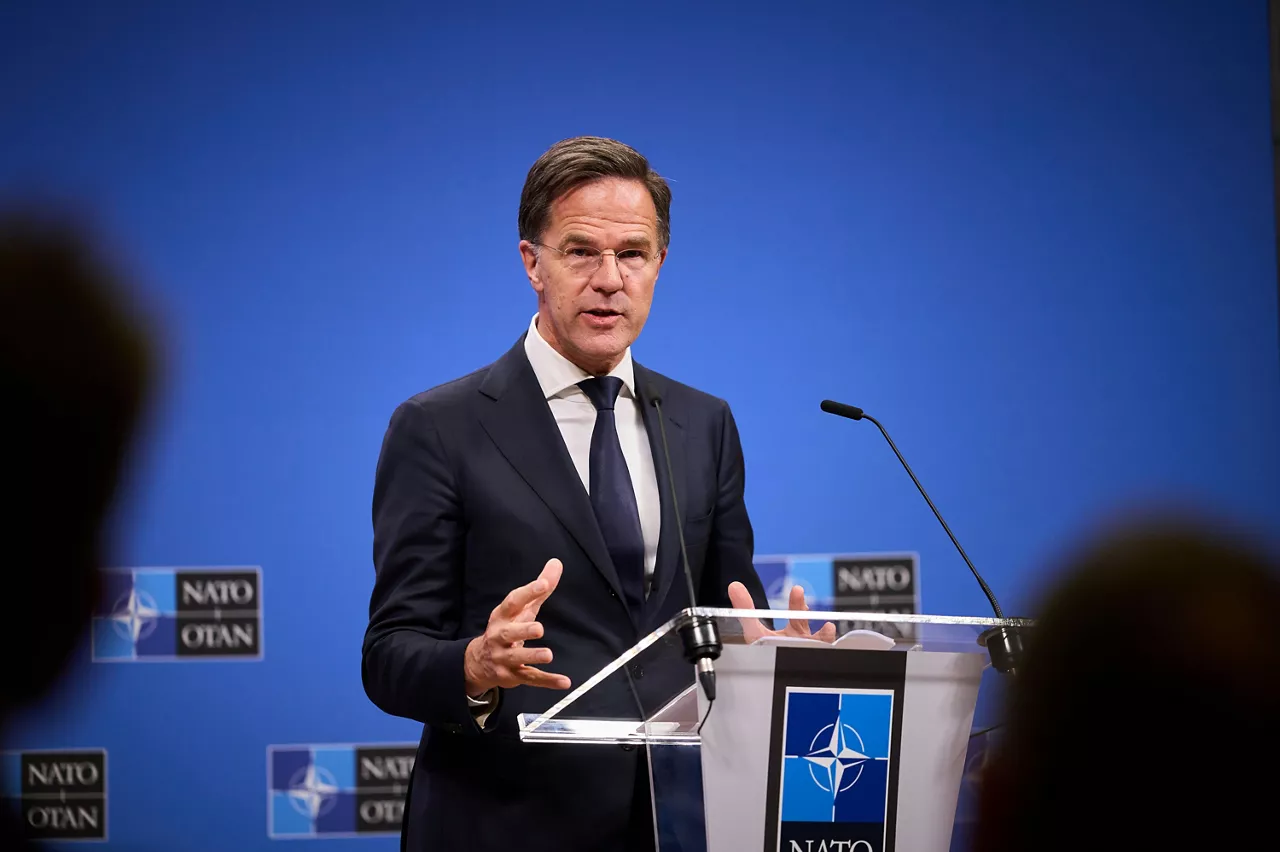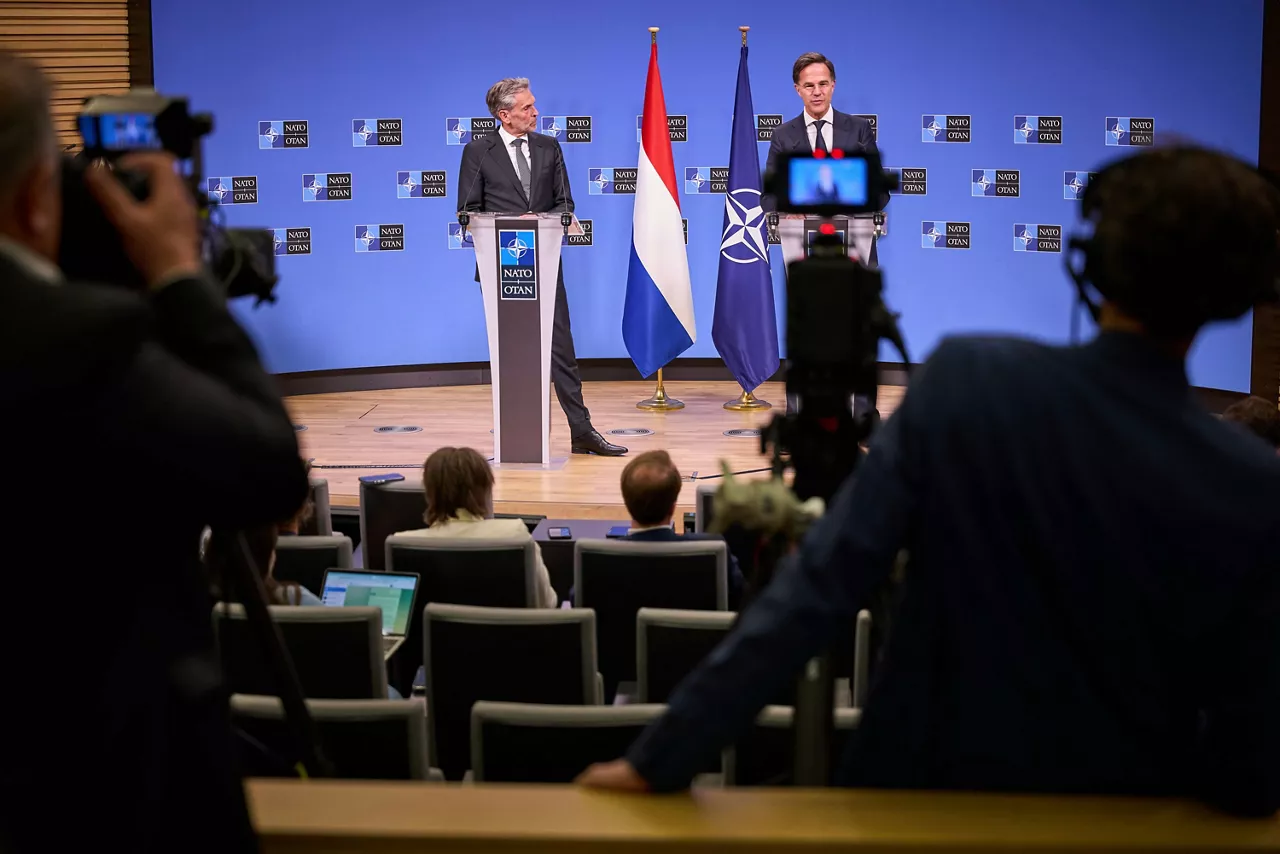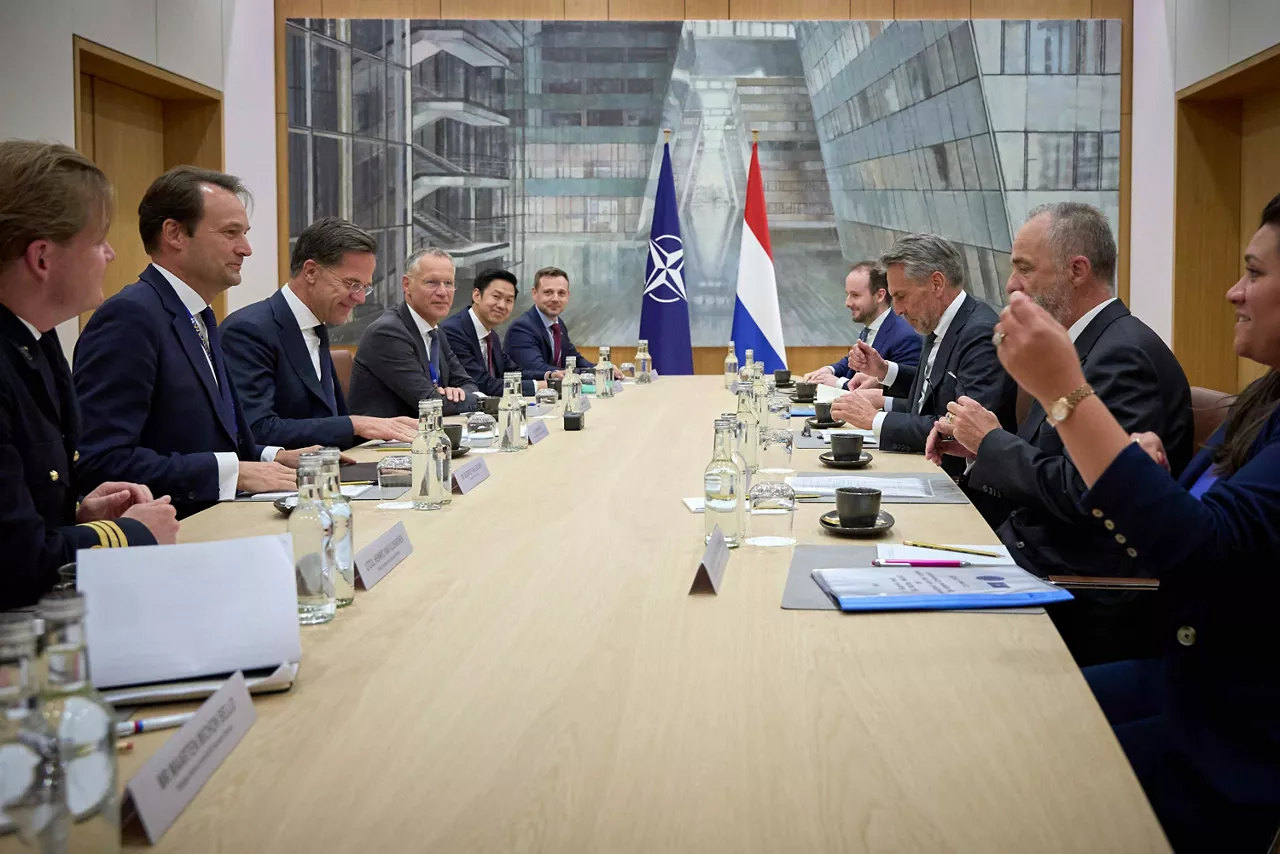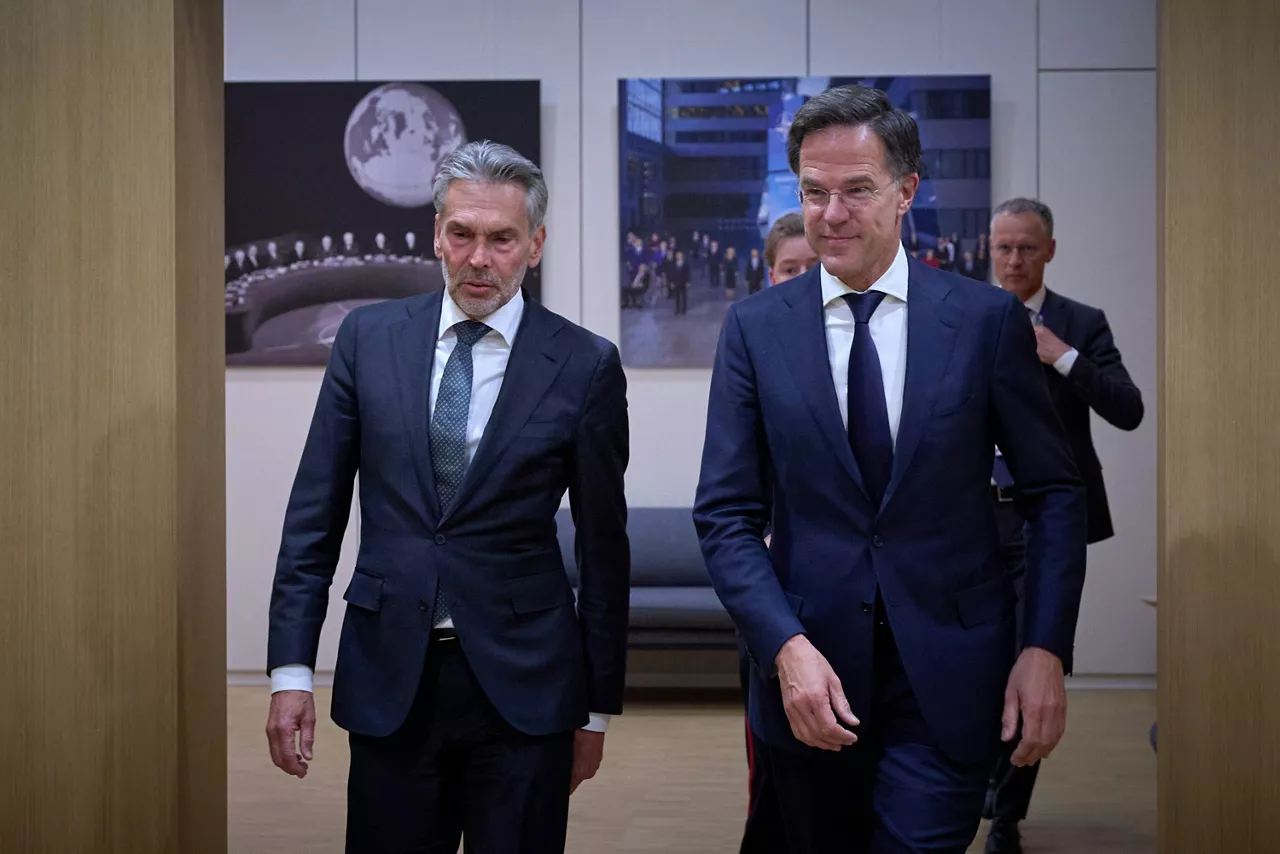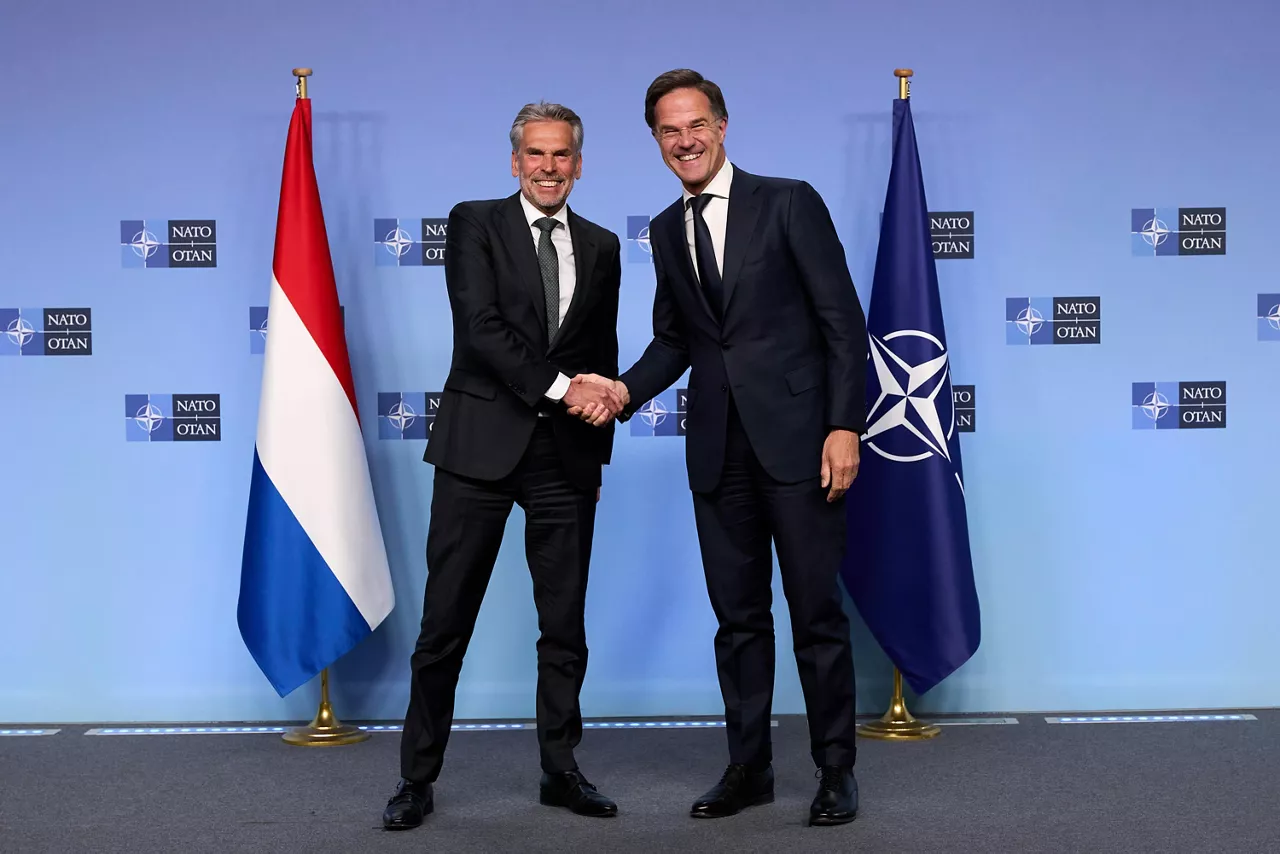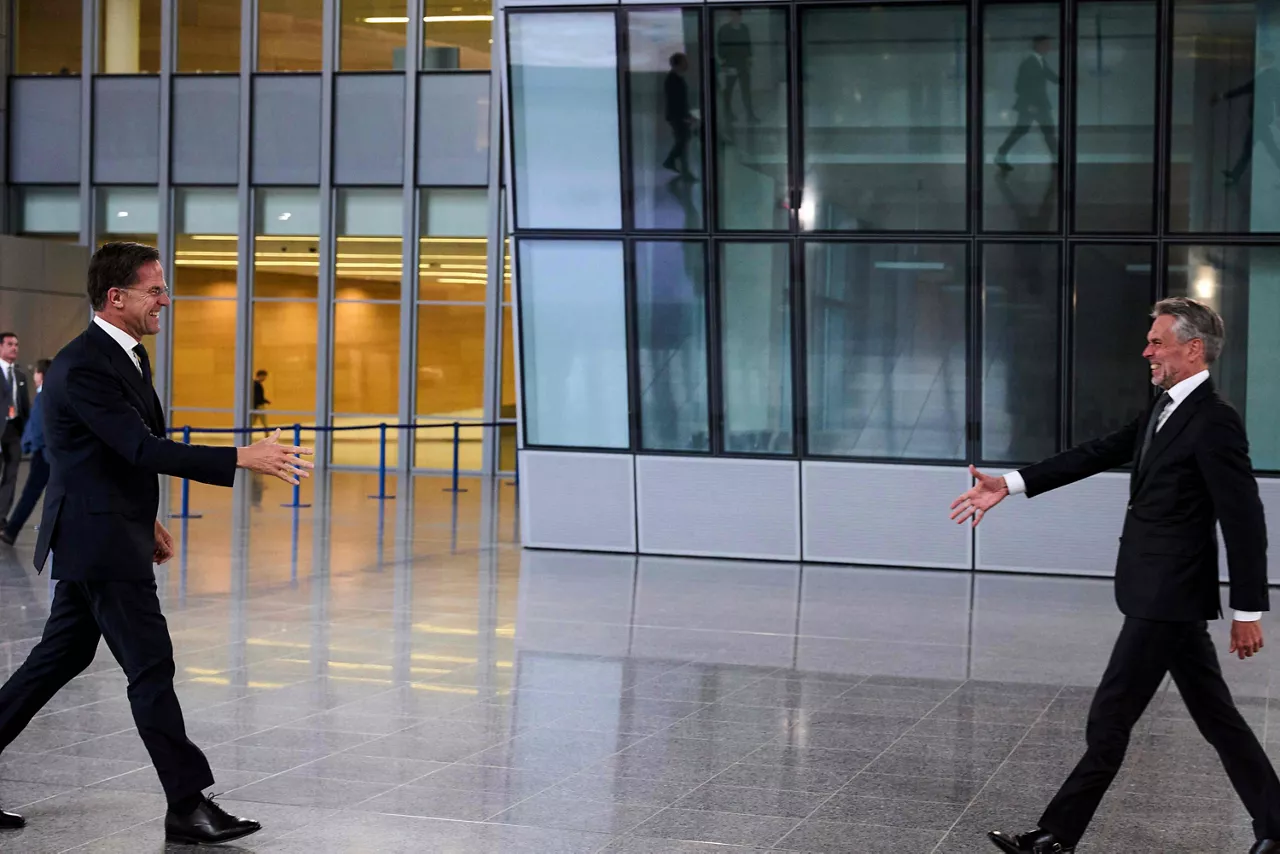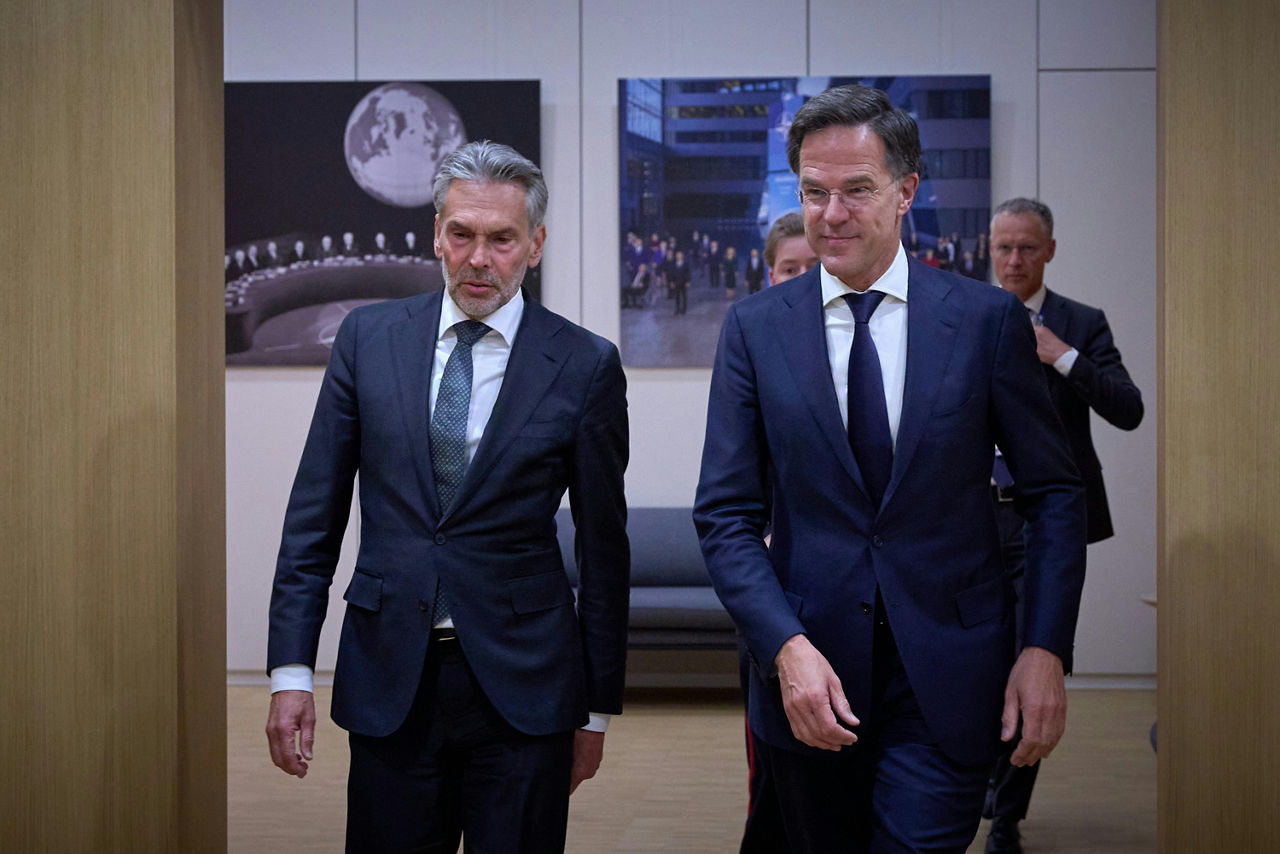Download NATO’s broadcast-quality video content free of charge

Log in
NATO MULTIMEDIA ACCOUNT
Access NATO’s broadcast-quality video content free of charge

Check your inbox and enter verification code
You have successfully created your account
From now on you can download videos from our website
Subscribe to our newsletter
If you would also like to subscribe to the newsletter and receive our latest updates, click on the button below.
Enter the email address you registered with and we will send you a code to reset your password.
Didn't receive a code? Send new Code
The password must be at least 12 characters long, no spaces, include upper/lowercase letters, numbers and symbols.
Your password has been updated
Click the button to return to the page you were on and log in with your new password.
(As delivered)
Prime Minister Schoof, dear Dick,
It’s great to have you here in Brussels, and it’s always good to see you.
We have just concluded productive discussions on a range of critical issues, but let me begin by expressing my gratitude to you and the Netherlands for your steadfast contributions to our collective defence.
The Netherlands continues to play a pivotal role in strengthening our Alliance. Dutch troops are deployed as part of NATO’s forces in Lithuania, bolstering our deterrence and defence on the Eastern Flank.
Dutch F35s contribute to NATO’s air policing missions in the Baltic region, protecting our airspace and our people.
And you also protect us right here, guarding Benelux airspace alongside the Belgian Airforce.
A Dutch ship is currently leading one of NATO’s maritime groups.
And you build stability beyond our borders. In Iraq, a Dutch Lieutenant General, Lucas Schreurs commands the NATO Mission, and Dutch instructors continue to train local forces to stabilise the region and counter terrorism.
I would also of course like to thank you for the excellent cooperation in organising the NATO Summit in The Hague. And also the related events on the 24th and the 25th of June next month.
Boosting defence spending to strengthen our collective security is our top Summit priority.
In 2024, the Netherlands invested 2% of GDP in defence.
Your plans to modernise your land forces, and your investments in cutting-edge capabilities, such as F-35 aircraft, frigates. This will enhance our interoperability, our readiness and our strength.
And just last week, you announced the acquisition of 46 Leopard tanks.
But it is clear that 2% will not be nearly enough to meet the capability targets that Allies will soon agree.
And to ensure our Alliance remains able and ready to deter aggression and to protect our one billion people.
We need to invest more in our essential military needs and in broader defence-related areas, like infrastructure, resilience, but also in our defence industry.
Your government’s recent decision to allocate over one billion euros for the expansion of the Dutch defence industry is an example to follow.
And of course, we also discussed Russia’s ongoing war against Ukraine.
I very much welcome your promise to deliver an impressive €3.5 billion euros in support for Ukraine in 2026 as well as 700 million euros to procure drones. And your recent announcement of 100 million euros to NATO’s Comprehensive Assistance Package for Ukraine. This also underscores your unwavering commitment to Kyiv’s sovereignty and security.
And this is a priority we all share.
And while we reiterated our full support to the urgent efforts to bring the war to a just and lasting end, we must continue to ensure Ukrainians have the resources they need to protect themselves.
So once again, thank you, dank je wel, Dick, for your presence here today, and for your personal dedication to our Alliance.
I look forward to opening the World Forum Summit venue with you next month!
And with that it’s my honour and pleasure to give you the floor.
Allison Hart, Acting NATO Spokesperson
Alright. We now have time for a few questions. I would be grateful if we could ask the questions in English, please, for the sake of the room and our online audience. Alright, I'll start here with the glasses.
Michael Kerres, NRC
I have two questions, if I may. One for the Secretary General. Five weeks to go, what are the most critical points that keep you awake going into the Summit. And for the Prime Minister, how are you going to convince the public and Parliament to spend so much money, extra money on defence in the coming years, if Donald Trump says that he simply trusts Putin. So the main adversary of this organisation, that's where we all putting up all this money for, is not seen as a real danger in the US, it seems.
Mark Rutte, NATO Secretary General
Well, I'm not sure I would completely agree with your assessment on that specific issue, but to your question to me, I must say I sense broad base support for what we need to achieve in The Hague. And that is indeed considerably more spending on defence and on everything which is related to defence, because you not only have to spend on defence itself, we also have to build the defence industrial base. We have to spend money on resilience. We have to make sure that a bridge is not holding our cars, but also capable to carry our tanks and our railways, etc... So there is a lot to be done, that will be much more money. I'm not confirming the numbers which are out there. This is good journalism, so I respect you for that, but not up to me to confirm anything, because we are still discussing that, but I feel broad base support, and I think we will get there. And that is important, because we have a couple of things at the same time. One is we have this whole process in NATO, which will lead to an assessment of the gaps we have in our defence, and they are considerable. Today, we can defend ourselves, but between three and five years, we have a problem. That's problem one, and that's why we need to fill those gaps, make sure that we reach the capability targets. And the capability targets we will agree on with the Defence Ministers on June 5, and that will then lead into the Summit and also advise us on how much money we need to spend. So there's a clear link between the money spent and what we need to spend it on, and that has a link with the capability targets. But there is a second issue, and that is that the Russians are reconstituting themselves much faster than we feared. I said it before. They are now producing in terms of ammunition in three months, what the whole of NATO is producing in a year. And this is only ammunition. And NATO is 25 times bigger as a collective economy, than the Russian economy. So that economy, which is 1/25 of the total NATO economy, is producing four times in ammunition. But the whole of NATO... That's unsustainable. And that is why, next to spending, to develop the defence industrial base and make them produce much, much more than they do now, ramping up production, extra production lines, extra shifts, stretching the assets is really crucial, and getting the innovation going. And thirdly, Ukraine and on all these issues, I feel a sense of urgency with all the allies. I feel broad base support for some of the thoughts I brought out thinking to bring us on to one page. There's still a lot of work to be done. Next step is the Defence Ministers meeting, and then, of course, we will go into the Summit in the Hague, but I think we will get it.
Allison Hart, Acting NATO Spokesperson
Let's hear the, in the front, yeah.
Question
Good afternoon. First to the Prime Minister, if I may. Yesterday, the Dutch Defence minister informed the Parliament about NATO, NATO capability needs and estimated that it will require some 16 to 19 billion euros extra a year for the defence spending, a huge amount of money for the Netherlands. Where will this money come from? And a related question, I think the Netherlands is one of the few countries, maybe the only one that will not make use of the escape clause in the Stability and Growth Pact as offered by the European Commission for defence spending. Isn't that a huge mistake by putting your own country in a much worse position than all the other EU countries? And to the Secretary General, if I may. In December, you said in a newspaper interview that the Netherlands can raise the defence spending by making some small cuts, I quote, to things like pensions and health care. Did you repeat that advice today to your successor? And if not, what other advice did you give? Thanks.
Mark Rutte, NATO Secretary General
Yeah. And then to your question, what I tried to say in December is this, that if we stick at 2% core defence spending. Again, we can defend ourselves now. So if Vladimir Vladimirovich Putin, would think he can attack us, our reaction will be devastating. My worry is about three to five years from now. Some are saying seven years from now, but at least in the foreseeable future, we are really in trouble if we do not spend much more. And this is about our collective safety. And then some would be saying, yeah, but this is more a problem for the countries who are bordering on Belarus or Russia like Estonia or Poland. This is not true. With the latest missile technology out of Russia, the difference between an attack on Poland and an attack on Rotterdam is five minutes. So we are all now at the eastern flank, not only those on the map on the eastern flank, but all the countries in NATO are on the eastern flank. And then, of course, there was the discussion, where to get the money from. And maybe I should have been more complete, because what I should have said is there are a couple of ways to raise that money. Of course, you can shift some spending from one item of spending to other items of spending. You can increase taxation. You can also increase your deficit. I mean, this is not new. This is what every government in Europe and in America and Canada knows that there are basically three sources of money, which is the deficit, it is taxation or making savings elsewhere, and it depends a little bit on the makeup of the government or what happens. But I, what was behind this is that Europe, collectively, at this moment, is 10% of the world's economy, but is 50% of the world spending on pensions, health care and social security systems. So with 10% of the economy, we spend 50% of world spent, money spent, on these issues. Which is great. I mean, I'm not against it. This is why we have such a fantastic part of the world to live in. But I mean, what is the use of all that spending if you run the risk that you have to learn Russian between now and 10 years and then you give it to them? So our defence is also very important.
Allison Hart, Acting NATO Spokesperson
Third row.
Andrew Gray, Reuters
Andrew Gray from Reuters. A question for both of you, Prime Minister as the host of The Hague Summit, and for the Secretary General. You both talked about the importance of showing support for Ukraine. One way that NATO has done that in recent years is by inviting President Zelenskyy to attend the Summit to address leaders at the Summit. Do you anticipate doing that this year, and do you have any concerns about a possible repeat of the Oval Office clash between President Trump and President Zelenskyy if you do that, thank you.
Mark Rutte, NATO Secretary General
As soon as we bring the program out, we will bring the program out. So please wait a little bit, but we will make announcements soon on the exact program of Summit.
Alexander Bakker, De Telegraaf
I have a question on the capability targets. We've seen the Americans saying that Europe is not their first priority anymore. There are 100,000 American soldiers in Europe. The new capability targets, are they proof for the situation that we have less American soldiers here on the ground? And the second, if I may, The Hague investment plan will be the biggest budget shift in decades for many countries. Are you going to be more transparent on the capability targets because they are coupled with this plan?
Mark Rutte, NATO Secretary General
We try to be as open as possible. Obviously, you do not want to make Putin or the Chinese - by the way, they are also building up their armed forces at an incredible speed - and we have terrorism, which is also a threat to NATO. So, you do not want to make the ones wishing us ill – not well – they [who] are against us, to be much wiser than they are already. But as I said before, this will be about long-range missiles, it will be about command-and-control systems, it will be about air defence systems, manoeuvrable land formation. These are four of the key priorities, where, as Europeans and Canadians, we have to invest much more in than we are doing at the moment, forget that you can ever get there with 2%. It will be considerably north of 3%, as I said before. And yes, there is a total link between capability targets and extra money to be spent. There are two other issues, and it is that the Russians, as I said, are reconstituting themselves much faster than we anticipated. And there is a third issue, and that is that there is a total commitment by the Americans to NATO, but that goes hand in hand with an expectation that the Canadians and Europeans in NATO will more or less spend the same amount of money on defence as they are doing. So, this is also a clear thing we have to take into account, which is only logical. And this has been a consistent demand from the Americans for many years, and particularly Donald Trump, when he was in his 45th presidency, was very clear on this, and I can assure you that Trump 47 is not very different from Trump 45 from that point, and I completely concur with him. Because why would Europeans spend less than Americans on our collective defence? So, for these three reasons, we will be as transparent as possible going forward.
Allison Hart, Acting NATO Spokesperson
Fourth row, please.
Adam Rasmi, Time
First one is to the Prime Minister. I'll just ask something quite direct. But does the Netherlands plan to agree to the expected 5% defence target at The Hague and the second one for the Secretary General. In regards to the cease fire talks on Monday, are you still optimistic about the talks in light of Trump's phone call with presidents Putin and Zelenskyy?
Mark Rutte, NATO Secretary General
On your second question, let's not think that this one phone call can solve this terrible war between Russia and Ukraine. Nobody will think that. But the fact that President Trump, when he came into office, broke the deadlock when it comes to discussing directly with Putin, which had not taken place for many years from the American side, really having this heartfelt ambition, which I totally share with him, of ending this bloodshed; thousands of people a week dying and getting seriously wounded on both sides, by the way, and ending this terrible war of aggression of the Russians against Ukraine. Him doing that, being the president United States, the most powerful nation on Earth, the biggest economy, the biggest military, is important. And on Monday, I think, phone call is necessary, this type of discussion is necessary with solutions to bring this forward. I think it was very good that he closely coordinated before the phone call with Europe and with Ukraine, and immediately after the phone call, there was a readout and a whole discussion again with Europeans and Ukraine. So, and I spoke today with President Zelenskyy, we are really working very much together, all of us, to make sure that collectively, we do everything we can to bring this terrible war to an end. But it has to be an end point where Putin will never, ever try this again. And this is a lesson we learned in 2014 with the Minsk agreement. So, he has to know that when there is a cease fire/peace deal, that he will never again try to capture one square kilometre, square mile of Ukraine. That's crucial.
Allison Hart, Acting NATO Spokesperson
Ok, we have time for one more question. In the centre, here.
Jolanda de Koster, ANP
Hello. This is Jolanda from the Dutch press agency ANP. I have a question for Mr. Rutte and for Mr. Schoof. Wow will it be monitored, the defence spending on the 5%, or what percentage it will be. Is there a procedure, a special agency who will monitor it? And for Mr Schooff, can you say something about the big protest last weekend in the Netherlands. You didn't say anything about it on Gaza developments.
Mark Rutte, NATO Secretary General
Yes on your first question, NATO has a well-established system where we have agreed collectively what is defence spending and what is not defence spending. For example, developing your defence industrial base is not in the 2% at the moment, and will therefore not be in the new target we will establish in The Hague. But when it comes to buying from your own defence industrial base, obviously, that is part of the present 2% and the new number going forward. So, we will not change those definitions. So, there are clear definitions on what countries can put in as defence spending. And NATO is then tracking that, sometimes challenging countries, saying, ‘hey, you might have been a little bit too lenient here and there, and a bit too liberal in the definitions’, and then you have the debate. But that is a clearly established process, and we will continue using that and it is well respected by all the Allies.

